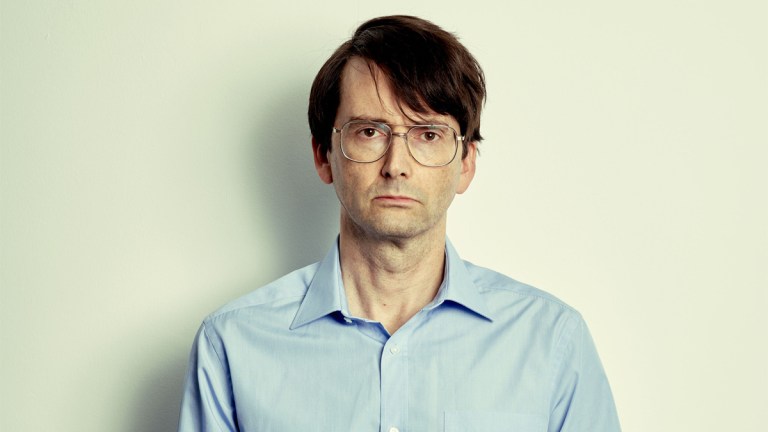Des Episode 1 Review: David Tennant is Scarily Good as Real-Life Serial Killer
David Tennant plays British serial killer Dennis Nilsen in three-part drama Des airing on consecutive nights this week. Spoilers ahead.

This Des episode one review contains spoilers.
ITV must be feeling confident about the nation’s emotional resilience. While other channels are scheduling there-there comfort shows to hug us through These Unprecedented Times (there’s a new James Herriot on 5, and the BBC has just finished series four of Strike – a murder show, yes, but one overwhelmingly focussed on the immediate and pressing need for its two comely leads to start boning), ITV brings us the true crime tale of serial killer Dennis Nilsen.
From Monday to Wednesday, ITV’s bedtime story will be about decomposing corpses, boiled human heads and a psyche so unsettling it’ll undermine any faith you had in the kindness of strangers. This is anti-comfort TV, a visit to the psycho zoo where the price of admission gets you a long, hard look into the eyes of a personality gone terribly, terribly wrong. Then on Thursday, it’s topped off with a one-hour documentary featuring real interview footage of Nilsen, so viewers can contrast and compare the drama with the real thing.
Do that, and you’ll see how miraculous is the casting of David Tennant as the lead. Tennant has a look of Nilsen, is Scottish like Nilsen (well, not quite like him. Tennant’s from West Lothian instead of Aberdeenshire but the accent seems flawless), and as Nilsen, employs his on-screen charisma to horrid effect. It’s such a good fit and such a compelling performance that Tennant may struggle to shake off the association in future. The actor’s a decade past Doctor Who, and has been so prolific in that time that he’s now fully outside the shadow of the TARDIS. Nilsen may prove almost as tricky to escape.
Until Harold Shipman queered the pitch, Nilsen was Britain’s most prolific serial killer. Between 1978 and 1983, he strangled and drowned at least 12 men and boys before being arrested when human remains were discovered blocking the drains at his London home. That discovery is the starting point for this three-parter. We’re shown Nilsen’s arrest, his chillingly offhand approach to police interview, and the prelude to a series of conversations he has with Brian Masters (Jason Watkins), the biographer who in 1985 published Killing for Company, the book on which the series is based.
It’s a solid and familiar cast. Nilsen’s arresting officer DCI Peter Jay is played by Daniel Mays in yet another copper role. Mays’ everyman humanity is a useful foil for Tennant’s glib lack of emotion in episode one. Jay is the empathetic face to contrast with Nilsen’s detached, cavalier persona. He struggles and retches as Nilsen casually flings off the hideous details of his crimes. The real double act in Des, though, is with Jason Watkins as Masters. Things really start sparking in the final scene between Tennant and Watkins, when manipulative narcissist Nilsen expresses faux concern for the “poor men” he killed, and asks Masters to please call him “Des” – the affable disguise under which he successfully hid his crimes for years. The thrill of that scene promises better to come in episodes two and three as Masters begins his research proper.
In divining the aim of this drama, what we’re not shown is almost as important as what we are. We don’t see the murders, nor do we meet the victims or flash back to them being ‘befriended’. The focus is held narrowly on Nilsen’s unsettlingly offhand attitude towards his arrest and towards the murders themselves. This is an examination of an abhorrent personality, with two key questions at its core: How did Nilsen kill for so long without detection? And what explains, as Masters puts it, the “dichotomy between this seemingly normal, unobtrusive civil servant and the nature of his crimes?”
Both questions are asked on-screen by characters in episode one, and the drama posits a few answers. Q. How did Nilsen kill without detection for so long? A. By preying on the homeless – the UK’s most vulnerable population, as contextualised by the doc-style news montage that opens the episode with mass unemployment, addiction and poverty in the capital of Thatcher’s Britain.
Another enraging answer emerges when a would-be victim of Nilsen’s returns to the police after escaping the killer three years earlier. He’d reported the attempted murder at the time, but institutional homophobia had created a blind spot that allowed Nilsen to continue undetected. Because the crime had been committed in the context of what the police saw as a gay sexual encounter, it was dismissed as “a lover’s tiff” with which they wanted nothing to do. Had that report been treated with the seriousness it merited, Nilsen could have been investigated and stopped far earlier, saving multiple lives. Even more enraging is that this crucial lesson about police discrimination endangering lives is yet to be learned. The recent cases of murderer and rapist Stephen Port, jailed in 2016, and prolific rapist Reynard Sinaga, jailed in 2020, along with contemporary Black Lives Matter protests show how prejudice in the police service continues to endanger the lives it should be protecting.
Episode one offers no suggestions to the second question, Des’ main query: just what explains this man’s aberrant psychology? One of the hour’s most chilling moments is when Nilsen is posed that question in police interview and responds coolly, “I was hoping you could tell me.” Over the next two nights, the audience is right there with him, waiting for this compelling true crime drama to provide answers.
Des continues on Tuesday the 15th of September at 9pm on ITV1.


